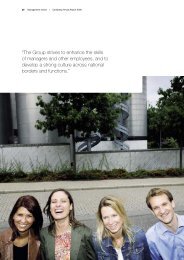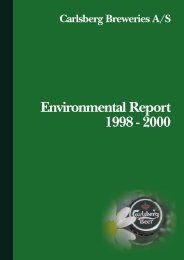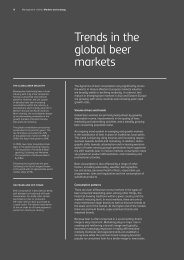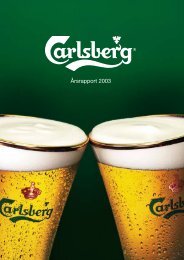Social & Environmental Resposibility - Carlsberg Group
Social & Environmental Resposibility - Carlsberg Group
Social & Environmental Resposibility - Carlsberg Group
- No tags were found...
You also want an ePaper? Increase the reach of your titles
YUMPU automatically turns print PDFs into web optimized ePapers that Google loves.
34 Management review / <strong>Carlsberg</strong> Annual Report 2006“Responsibility is one of the <strong>Carlsberg</strong> <strong>Group</strong>’s corevalues. Responsible business reduces risks, increaseseffi ciency and contributes to a good reputation, whichenhances value creation in the longer term.”
<strong>Carlsberg</strong> Annual Report 2006 / Management review 35<strong>Carlsberg</strong> and society<strong>Carlsberg</strong>’s responsibilities to society and its stakeholdersare an integral part of its business strategy.Responsibility is one of the <strong>Group</strong>’s core values, andwe work from a conviction that responsible businessreduces risks, increases effi ciency and contributes to agood reputation, which enhances value creation in thelonger term.At <strong>Carlsberg</strong>, responsible business spans areas such asthe environment, health and safety, marketing, labourstandards and human rights. The <strong>Group</strong>’s approach hasbeen translated into policies and guidelines, including aCode of Responsible Management, Beer AwarenessProgramme and <strong>Environmental</strong> Policy. These guidelinesapply globally and can be found on the <strong>Group</strong>’s website.Responsible management<strong>Carlsberg</strong>’s management strategy has a local focus,which means that account can be taken of cultural differencesand local customs when policies for responsiblebusiness are put into practice. For a global player,local adaptation is important to ensure that the spirit of<strong>Carlsberg</strong>’s policies is refl ected in concrete managementbehaviour.To ensure that the <strong>Group</strong>’s brands are marketed responsibly,<strong>Carlsberg</strong> has laid down guidelines in the form of aCode of Marketing Practice, which applies to all the<strong>Group</strong>’s markets.Responsible consumption<strong>Carlsberg</strong> shares society’s concerns about the misuse ofalcohol. The <strong>Group</strong> therefore plays an important role inefforts to prevent and solve problems with misuse bypromoting responsible consumption through both concreteactions and market communications.<strong>Carlsberg</strong> aims to promote effective solutions to the misuseissue by entering into dialogue with stakeholdersand cooperating with governments, public bodies,NGOs and trade organisations in the local markets. Atinternational level, <strong>Carlsberg</strong> has a dialogue with theWHO and EU. The <strong>Group</strong> also supports research intothe medical and social aspects of alcohol consumptionthrough the European Research Advisory Board.The environment at <strong>Carlsberg</strong>The <strong>Carlsberg</strong> <strong>Group</strong> recognises the environmental responsibilitiesthat go with its leading global position, andtakes account of environmental issues in both the continueddevelopment of its existing activities and theestablishment of new ones.This commitment to the environment is anchored in<strong>Carlsberg</strong>’s <strong>Environmental</strong> Policy, which is supplementedwith and implemented through the local companies’ ownenvironmental policies. The <strong>Environmental</strong> Policy is presentedon the <strong>Group</strong>’s website. One element of the policyis to encourage suppliers and other business partnersto shoulder their own environmental responsibilityand act accordingly.
36 Management review / <strong>Carlsberg</strong> Annual Report 2006“<strong>Carlsberg</strong> takes account of cultural differences andlocal customs when policies for responsible businessare put into practice.”<strong>Environmental</strong> managementAlmost all of the <strong>Group</strong>’s majority-owned productionsites have implemented the externally certifi ed environmentalmanagement system ISO 14001. When newbreweries are acquired, the goal is for these to be certified within two to three years.The companies in the <strong>Group</strong> record all relevant environmentaldata and report them to the <strong>Group</strong>’s headquarters,where developments are monitored. The environmentalmanagement systems are also audited regularlyboth internally and externally to ensure that the <strong>Environmental</strong>Policy and established improvement programmesare implemented.Every second year <strong>Carlsberg</strong> publishes an <strong>Environmental</strong>Report with detailed information on the business’s overallenvironmental impact. The next <strong>Environmental</strong> Reportwill be published in 2007, and previous editions can befound on the <strong>Group</strong>’s website.Energy managementIn line with its <strong>Environmental</strong> Policy, the <strong>Carlsberg</strong> <strong>Group</strong>strives constantly to minimise its environmental impactCombating drink-drivingIn 2006 <strong>Carlsberg</strong> Serbia launched a campaign tocombat drink-driving in conjunction with the country’slargest music festival, EXIT. Visitors from Serbia, Bosnia,Croatia, Slovenia, Macedonia and Montenegrowere offered free transport to and from the festival toavoid alcohol-related accidents. The aims of the campaignwere to increase general awareness of alcoholmisuse, and stress that drinking and driving do not mix.The campaign was the first of its kind in Serbia andwas a major hit with both the public and the media.Better working conditionsfor beer-sellersIn Cambodia it is customary for beer to be sold byyoung women in restaurants and nightclubs. Thesewomen’s working conditions have come in for criticism,partly because they can be exposed to sexualharassment. Since acquiring its 50% stake in Cambodianbrewery Cambrew in 2005, <strong>Carlsberg</strong> has beenactively helping to improve the working environmentand general working conditions for these women. Togetherwith other brewers in the Cambodian market,<strong>Carlsberg</strong> has developed a joint Code of Conduct,which includes fixed rates of pay, transport to andfrom work, and training to help improve the women’sworking conditions.New trucks in the UKWhen distribution in the UK was reorganised, <strong>Carlsberg</strong>purchased 80 new environmentally friendly trucks.These have better fuel economy and emit fewer pollutingparticles than the vehicles previously used. The newtrucks also offer a better working environment fordrivers, as the loading area is equipped with a numberof devices to ease the physical burden on them.As a result of this positive experience, <strong>Carlsberg</strong> will begiving higher priority to environmental aspects whenchoosing suppliers and truck types in other countriestoo.
<strong>Carlsberg</strong> Annual Report 2006 / Management review 37and reduce the consumption of resources in the courseof its activities. <strong>Carlsberg</strong> believes that continuously reducingthe consumption of water and energy in productionhas great potential both environmentally and fi nancially.The legislation on CO 2emission allowances introducedby the EU has not led to any major changes, and overall<strong>Carlsberg</strong> had unused allowances available to sell in2006.Against this background, an energy management projectwas launched in 2006 to systematically review the<strong>Group</strong>’s production sites and identify and implementways of optimising resource consumption.<strong>Environmental</strong>ly friendly refrigeratorsAt the end of 2006 <strong>Carlsberg</strong> decided to start phasingout the use of refrigerators containing HFCs. The vastmajority of refrigerators in the retail trade containthese greenhouse gases. By being among the first tocall for HFC-free refrigerators, <strong>Carlsberg</strong> is putting its<strong>Environmental</strong> Policy into practice. In 2007 <strong>Carlsberg</strong>will purchase new environmentally friendly refrigeratorson a trial basis for testing in Scandinavia.In 2006 <strong>Carlsberg</strong> also signed up to the RefrigerantsNaturally initiative, a coalition of six global companiesworking to promote environmentally friendly refrigeratorsin the retail trade. The initiative is supported byGreenpeace and the United Nations Environment Programme.Green energy in NepalBeer is now being brewed using green energy at thepartly <strong>Carlsberg</strong>-owned Gorkha Brewery in Nepal. In2006 the brewery began using a brewing vessel wherethe energy comes from burning rice husks rather thandiesel oil. Besides serving as a source of green energyfor the brewery, the use of these husks has a positiveeffect on the local economy, as rice producers cannow sell a product that previously went to waste. Thecollection and delivery of the husks also create jobs.



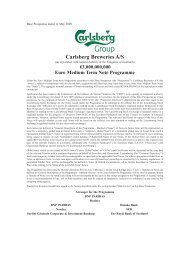
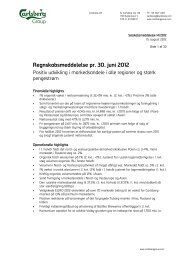

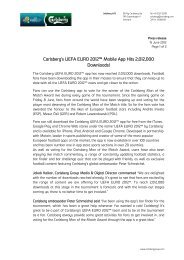
![[Name and Address] - Carlsberg Group](https://img.yumpu.com/49766377/1/184x260/name-and-address-carlsberg-group.jpg?quality=85)
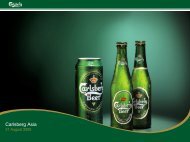
![[Name and Address] - Carlsberg Group](https://img.yumpu.com/49015962/1/184x260/name-and-address-carlsberg-group.jpg?quality=85)
